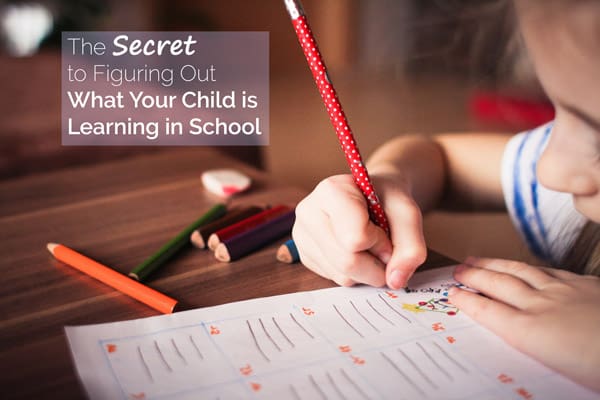The Secret to Figuring Out What Your Child is Learning in School
Sometimes it’s really hard to figure out what your child is learning in school. We’ve all heard it –
“What’d you do at school today?”
“Nothing.”
You can work on your conversation skills, but there are also other ways to figure out what your child is learning at their public school.
Start With the Standards
It helps to think like a teacher.
In the U.S., every state has adopted learning standards, such as the Common CoreStandards. These standards are goals for learning. Every grade level and subject area has them. Educators use them as guidelines when developing curriculum.Curriculum is different than standards. Curriculum is the content of what is taught to reach those goals. Then, there is also the order that the curriculum is presented across the school year.
To understand what your kids are learning, start by scanning the standards for your child’s grade level. Then, go to your district or school website. Hopefully, you’ll find some curriculum information there that isn’t too full of jargon.With a grasp of the standards and curriculum, it’s much easier to figure out what’s going on.
Behind the Scenes at School
Teachers look to the standards and to their curriculum as they create lesson plans. There are other considerations too, but if you know these basics it’s easier to be a detective when talking to your kids about their day.(I have a confession: I love talking with my kids about their day. It’s one of my favorite parts of my day. Once you get going, they love it too.)
Another thing — Teachers plan in lesson cycles. First they teach a new concept, then they give students time to practice it, and finally they assess how well the students learned. This cycle can happen all in one day, or across weeks.
When your child is first introduced to a new concept, they may not yet be able to verbalize what they learned. Be patient.
The Structure of Your Child’s Day
In addition to familiarity with the standards and curriculum, understanding how the classroom is structured can also help you figure out what your child is learning at school.
- Find out the daily schedule. Use it to structure your after-school interrogation of your child. Sometimes I like to start with what they did at the end of the day and work backwards.
- If you ask the same sorts of specific questions daily, your child will probably get better at answering them. He’ll pay more attention to, say, which reading center he goes to, or what math manipulative he got today.
- Try learning some magic words for triggering your child’s memory of their day. Do they have “carpet time,” “group time,” “calendar time,” or a “class meeting” first thing in the morning? Does literacy learning take place in “centers,” “stations,” “workstations,” “tubs” or something else? What are the magic words for math, science, and social studies?
More Secrets to Discovery
- If your child has access to computers or tablets in the classroom, you can find out what programs are being used. Often, schools can give you home login credentials.
- The younger the grade level, the more time spent on teaching the children how to behave in a classroom setting. At the beginning of the school year, don’t expect your child to get into the curriculum right away.
- Find out what kind of math manipulatives are being used. You could browse through the pictures here (affiliate) to see what your child recognizes. Then ask her to show or tell you what she does with those items in math class.
- Sometimes social studies is integrated with reading. Your child will think they were doing reading, but actually the
teacher has checked off a social studied objective as well. - Classwork that comes home only gives you a small picture of what your child is learning.
- Some amazing learning takes place that never generates paper to go home. Hands on activities are probably the easiest for your child to tell you about, though. And once you have a grip on the state standards, you may be able to see the big picture of what they were learning.
- Talk to the teacher, of course! (For tips, you can read my post on how to communicate with your child’s teacher)
The next time you have the urge to ask “What did you do at school today?” Take a moment instead to ask a more specific, informed question.It doesn’t have to be hard to figure out what is going on at your child’s school. I hope that soon it’ll be one of the favorite parts of your day too.
This post is part of the Bloggers for Public Education blog hop. Our topic this month is curriculum. You may like to read these insightful posts:
How I know that Common Core is Not a Bad Curriculum from Thriving STEM
What is Inquiry Based Science Curriculum? from Share It! Science News



Great tips! My children's teachers send home q newsletter every week that is pretty helpful too.
Thanks, Christy. I get regular classroom newsletters from 2 out of 4 of my kids' teachers too. It definitely helps!
Great tips for getting kids talking and investigating curriculum. As a former teacher I never minded having a parent ask me about curriculum. It was something I cared deeply about and wanted to share.
Thanks! My kids' teachers are open to those kind of discussions too. The school I taught at had low parental involvement, and I almost never got asked about curriculum – although like you I'd have welcomed it.
I found it interesting. I have a very general idea what my daughter is doing in school but really wish schools would send more classwork back home. Especially frustrated with seeing my daughter writing work only in the end of the year!
Classwork really does make it easy to see what's going on. I think that fewer papers coming home can be a good sign too, though. It might mean that they're doing more meaningful activities and less busy work.
Last year my son's teacher sent home photocopies of "published" writing work and kept the originals in the students' portfolios. I volunteered once to help with copying, and it was a big project.